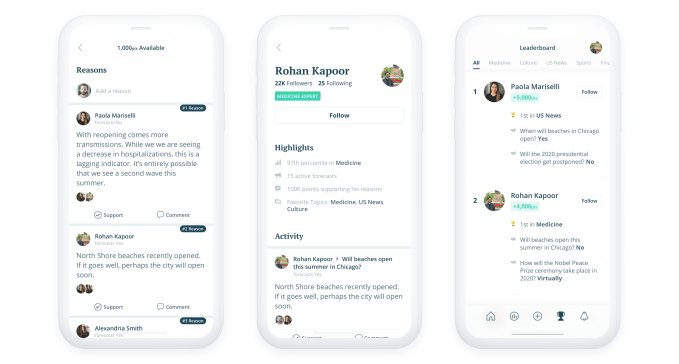Projection, a brand-new project from Facebook’s internal R&D group, NPE Team, is launching today to develop a community around forecasts. The iOS app will enable users to ask concerns and then use in-app points to make predictions about what might take place in the future. Users can also develop, go over and see these crowdsourced forecasts.
At launch, only invited individuals in the U.S. and Canada will be allowed to make predictions and talk while the app is in beta testing. But these forecasts and associated conversations will be publicly available on the Forecast website, and made shareable.
Before today, Facebook tested the item internally with a small set of employees. Their preliminary projections will form the initial core content in the app at launch.
Beginning now, Facebook will welcome members of the health, research study and academic communities to make predictions about the COVID-19 pandemic and its influence on the world.

Image Credits: Facebook
At a time when Facebook and other major tech platforms are under fire for their role in helping the spread of false information, fake news, propaganda, conspiracy theories and other non-factual material presented as reality, an app focused on making “guesses” about the future seems ill-advised– however informed those guesses might be. This is especially concerning because much of the app’s content will focus on guesses about COVID-19
Forecast’s forecasts might help show what individuals are believing, but COVID-19 isn’t a game. To comprehend the world, scientists form a hypothesis, which is basically an expanded form of an educated guess. They do not then crowdsource ballot to figure out if a hypothesis is true– they evaluate, experiment, collect supporting data, attempt to show and negate the hypothesis and eventually objective to publish their findings and have them peer-reviewed.
Instead of doing the work to check the projection, through the application of the clinical approach, Forecast will track the votes an offered question gets.
Questions will be examined by the Projection team and modified for clearness, if required. Users will be informed if their concern is published.
At some point, the concern will be figured out as “settled,” based on an elapsed time period or because an occasion has taken place. For example, if users were thinking when a vaccine would be released, and then it’s actually released, the concerns around that topics would be “settled.”
Forecast’s polls are provided aesthetically pleasing charts and graphs, which can be shared outside the app. That means users could begin posting these guesses and the crowdsourced reactions to sites like Facebook, where the line between reality and fiction has actually already blurred. That might even more complicate people’s understanding of what is already a complex topic: the COVID-19 pandemic.
Facebook users who see these shared “projections” may believe they have some basis in science and research study, when instead, they are the result of a social ballot app.
Obviously, there is some fun in banking on world occasions and seeing if they turn out to be true, and there is even some worth in arranging a broader neighborhood’s collective “best guesses” about a future occasion to get an understanding of what individuals are believing at an offered time. Crowdsourced forecasts have their place. However spreading out particular, COVID-19 forecasts to Facebook seems like an idea that’s stuffed with prospective issues and problems.
And Facebook’s goal here is just to test its own hypothesis– that a standalone, community-based forecasts app that rewards a participatory audience with social credit will appear informative voices and thoughtful conversations.
In the end, however, it appears like Facebook is looking for some angle that might prompt thought leaders to participate in significant conversations about topics they understand finest on a Facebook platform. These sorts of discussions are challenging to have in Facebook’s remarks area around a post– as comments, generally, are a location individuals go to troll, argue, threaten and otherwise hinder a conversation. Forecast organizes these experts around a subject and permits them to discuss. As a self-contained area with a vetted crowd of participants, that might be intriguing. Making the information broadly shareable is a concern, nevertheless.
Facebook says the concerns in Projection will be moderated for clearness utilizing Forecast’s own moderation standards and Facebook’s Community Standards. Concerns around illegal material or those involving individual details likewise aren’t permitted, along with other guidelines detailed here.
The Forecast app is live on the iOS App Store here.
TechCrunch.
